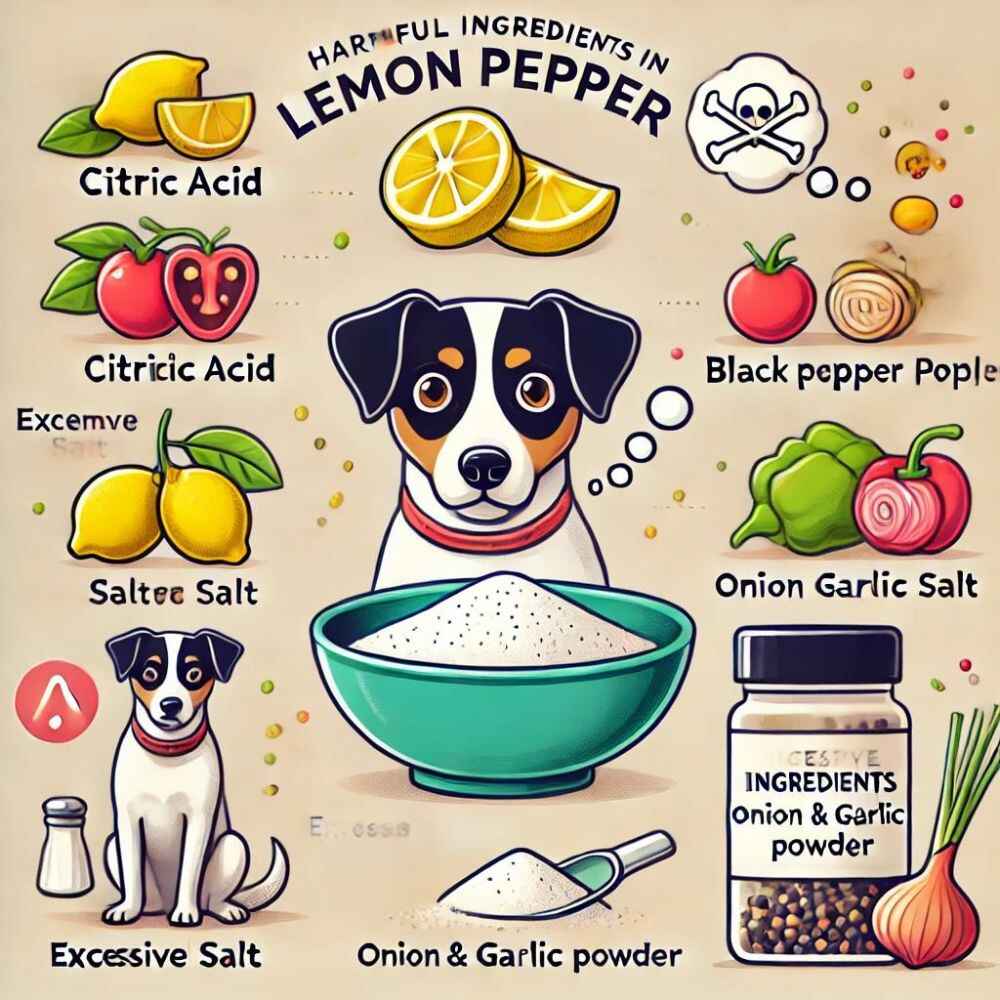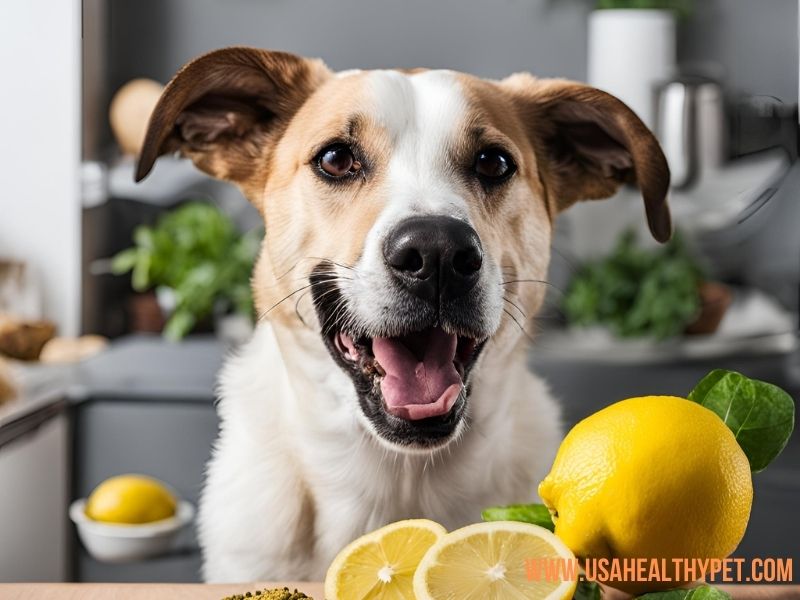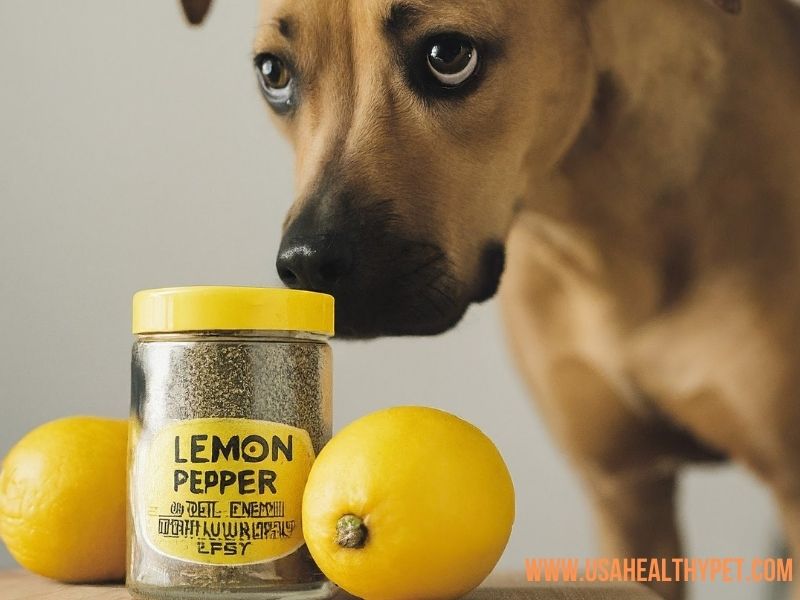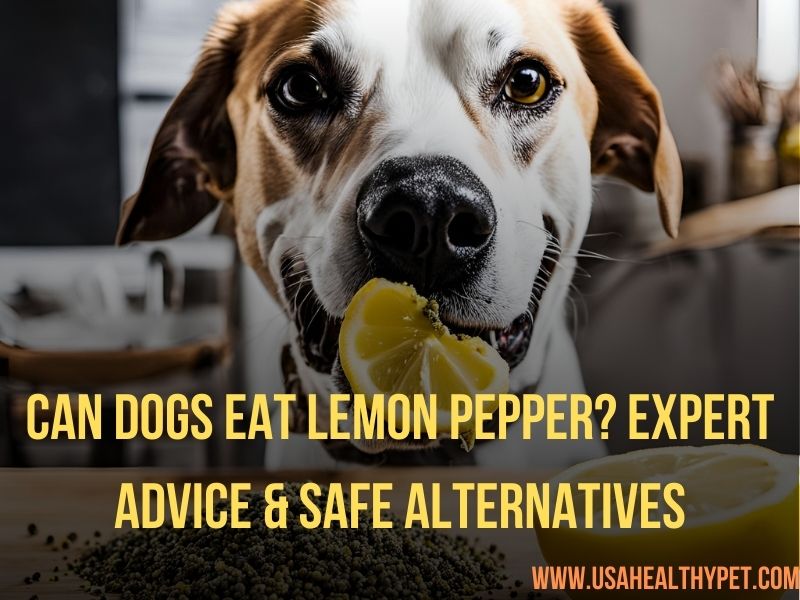Can dogs eat lemon pepper? Maybe you were preparing a delicious meal and dropped some lemon pepper seasoning on the floor, and before you could pick it up, your furry friend had already licked it.
If you’ve found yourself in this situation you’re not alone. Let’s dive into this question and find out whether lemon pepper is safe for our canine companions.
Key Points:
- Lemon pepper is unsafe for dogs due to harmful ingredients like lemon zest, garlic, onion, and salt.
- Even a small amount can cause gastrointestinal issues, dehydration, or more serious health problems like anemia.
- Lemon zest contains psoralens and essential oils, which are toxic to dogs and can lead to vomiting, diarrhea, or depression.
- Garlic and onion in lemon pepper can damage red blood cells, potentially causing hemolytic anemia.
- If ingested, monitor for symptoms like vomiting, lethargy, or tremors and contact a vet immediately.
- Safe alternatives for seasoning your dog’s food include herbs like basil, parsley, and rosemary.
Can Dogs Eat Lemon Pepper? The Quick Answer
No, dogs should not eat lemon pepper. While a tiny accidental lick might not immediately harm your dog, lemon pepper contains ingredients that can be toxic or harmful to dogs in larger quantities.
According to Dr. Karen Becker, a holistic veterinarian, “Dogs do not have the same tolerance for spices and flavorings as humans. Even ingredients that seem harmless can lead to serious health problems in dogs.” She explains that lemon zest contains essential oils and compounds like psoralens, which are known to be toxic to dogs and can cause stomach upset or more severe reactions.
It’s best to keep this seasoning far away from your furry friend’s food bowl!
Why Lemon Pepper Is Not Safe for Dogs
The Harmful Ingredients in Lemon Pepper
Lemon pepper isn’t just a simple blend of lemon zest and black pepper. Most commercial brands include ingredients like:
- Salt: Excessive salt can lead to dehydration or salt poisoning in dogs.
- Garlic and Onion: These ingredients are highly toxic to dogs and can damage their red blood cells, leading to anemia.
- Lemon Zest: The oils and compounds in lemon zest can cause gastrointestinal upset in dogs.
- Artificial Additives: Some seasonings may contain preservatives or artificial flavors that can irritate a dog’s digestive system.

Potential Health Risks of Lemon Pepper for Dogs
So, what could happen if your dog consumes lemon pepper? Here are some of the potential health risks:
- Gastrointestinal Issues: The lemon zest and pepper can cause vomiting, diarrhea, and stomach pain.
- Dehydration and Salt Poisoning: Too much salt can lead to dehydration, excessive thirst, urination, or even sodium poisoning in severe cases.
- Anemia: Garlic and onion, even in small amounts, can lead to hemolytic anemia, a serious condition that destroys a dog’s red blood cells.
- Allergic Reactions: Some dogs may have specific allergies to spices or lemon components, which could cause itching, swelling, or breathing difficulties.
Symptoms of Lemon Pepper Poisoning in Dogs
The National Animal Supplement Council (NASC) advises against feeding dogs any citrus products, including lemon zest, due to the presence of psoralens and essential oils, which can cause digestive issues. Their studies show that some dogs might experience vomiting, diarrhea, or even depression when they consume citrus in moderate to large amounts.
If your dog accidentally consumes lemon pepper, you should watch for the following symptoms:
- Vomiting or diarrhea
- Excessive drooling
- Lethargy or weakness
- Tremors or seizures
- Difficulty breathing
- Increased heart rate
If you notice any of these symptoms, it’s crucial to contact your veterinarian immediately.

What to Do If Your Dog Eats Lemon Pepper
First things first: don’t panic. If you suspect your dog has ingested lemon pepper, follow these steps:
- Assess the Situation: How much did your dog consume? If it was a small lick, they might be okay. If it was a large amount, call your vet.
- Contact Your Vet: Call your veterinarian or an emergency animal poison control center to get professional advice.
- Monitor Your Dog: Watch for any of the symptoms listed above. If symptoms appear, take your dog to the vet immediately.
Safe Alternatives to Lemon Pepper for Dogs
If you love cooking for your dog or want to share some of your meals with them, there are safer seasoning alternatives:
- Herbs: Basil, parsley, and rosemary are safe for dogs and can add flavor without the risk.
- Plain Pumpkin or Sweet Potato: Great for your dog’s digestion and adds a delicious taste.
- Cinnamon: In small quantities, it’s safe and has anti-inflammatory properties.
Can Dogs Eat Lemons or Black Pepper Separately?
Now, you might be wondering: if lemon pepper isn’t safe, what about its individual components?
Are Lemons Safe for Dogs?
No, lemons are not safe for dogs. The acidity in lemons can cause stomach upset, and the lemon peel contains essential oils and compounds like psoralens, which are toxic to dogs.
It’s best to avoid feeding your dog any citrus fruits.

Is Black Pepper Safe for Dogs?
Black pepper in small amounts isn’t toxic to dogs, but it’s also not recommended.
Dogs have a more sensitive digestive system than humans, and too much black pepper can lead to gastrointestinal distress, such as vomiting or diarrhea.
The Pet Poison Helpline, a 24/7 animal poison control service, reports numerous cases of pets becoming ill after consuming foods with seasonings like garlic, onion, and salt. They classify these ingredients as “toxic foods” and recommend avoiding all forms, including seasonings like lemon and black pepper.
Tips for Keeping Your Dog Safe from Harmful Foods
- Store Seasonings Out of Reach: Make sure spices and seasonings are kept in cabinets that your dog cannot access.
- Avoid Sharing Human Food: Even if those puppy eyes beg you for a bite, remember that not all human foods are safe for dogs.
- Educate Your Family and Friends: Make sure everyone in your household knows which foods are dangerous for your dog.
Conclusion
While giving your dog a little taste of what you’re cooking might seem harmless, lemon pepper is definitely not a seasoning to share.
With ingredients like lemon zest, pepper, salt, garlic, and onion, this blend poses a variety of risks to your dog’s health. Always opt for safer, dog-friendly alternatives and consult your vet if you’re ever in doubt.
FAQs
1. What should I do if my dog accidentally eats lemon pepper?
If your dog eats lemon pepper, contact your veterinarian immediately for advice. Monitor for symptoms like vomiting, diarrhea, or lethargy.
2. Can a small amount of lemon pepper harm my dog?
A small amount might not cause serious harm, but it’s best to avoid giving any to your dog. The ingredients in lemon pepper can be toxic in larger amounts.
3. Are there any seasonings safe for dogs?
Yes, some herbs like basil, parsley, and rosemary are safe for dogs. Always introduce new foods slowly and in small amounts.
4. Can dogs eat other citrus fruits like oranges?
Oranges are less acidic than lemons and may be safer in small amounts, but they should still be given sparingly due to their sugar content.
5. How can I flavor my dog’s food safely?
Consider using plain, cooked vegetables, dog-friendly fruits, or safe herbs like parsley. Always consult with your vet for personalized advice.

Pingback: Can Puppies Eat Plantain Chips? Risks and Benefits Explained